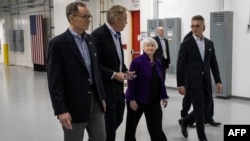Treasury Secretary Janet Yellen travels to China this week for high-level talks aimed at further stabilizing financial and economic ties between the world’s two largest economies.
During the visit, she is also expected to press China on subsidies for clean energy and industrial overcapacity that she recently noted “hurts American firms and workers, as well as firms and workers around the world.”
The April 3-9 trip is Yellen’s second to China and comes a day after U.S. President Joe Biden and Chinese leader Xi Jinping spoke in a phone call for the first time since meeting last November. It also comes as scrutiny of Beijing intensifies ahead of the U.S. presidential elections and Washington tightens curbs on the sale of high-tech goods to China.
Following the 105-minute phone call, Xi warned Biden that the U.S. was “creating risks” by suppressing China’s trade and technology development, according to state-run Xinhua news agency.
A senior Treasury Department official who briefed reporters ahead of the trip said that in addition to meetings with China’s economic czar, Vice Premier He Lifeng, and other current and former central government officials, Yellen will also meet with students, professors and business leaders.
Her visit begins with a two-day stop in the southern city of Guangzhou, where Yellen will hold a roundtable discussion with economic experts to discuss the challenges and opportunities of China’s economy, and meet with American business leaders and the governor of Guangdong Province, Wang Weizhong.
“Secretary Yellen is interested in listening to a variety of voices in China to better understand current dynamics in the country,” the official said.
In Beijing, Yellen will meet with students and professors at Peking University and some of China’s leading economists. Her meetings with central government officials will include sit-downs with the head of China’s central bank and finance minister.
Yellen will also meet with China’s No. 2 official, Li Qiang, during her visit.
A senior Treasury Department official said the trip aims to build on the intensive diplomacy Yellen has already engaged in to manage the relationship. Since her first visit to China last July, Yellen and Beijing’s He Lifeng have launched economic and financial working groups. The groups discuss issues that both country’s face — such as China’s property crisis or the failures of two major U.S. banks last year — and policy responses.
In recent weeks, the U.S. and European Union have increased their focus on subsidies and the impact of China’s excess capacity of goods and cheap exports.
Gary Clyde Hufbauer, a senior fellow at the Peterson Institute for International Economics and former Treasury official, said he believes the main purpose of Yellen’s visit is to speak with Chinese officials about overcapacity. But he doesn’t expect China to take any action.
“China might give sympathetic answers, but I don’t expect policy changes,” he told VOA’s Mandarin service via email.
Last week, Yellen said she does not want to focus on retaliation but will warn China about the impact its national underwriting of energy and other companies is having during her visit.
“I intend to talk to the Chinese when I visit about overcapacity in some of these industries, and make sure that they understand the undesirable impact that this is having — flooding the market with cheap goods — on the United States, but also in many of our closest allies,” Yellen said.
Her remarks came during a visit to a solar manufacturing factory in Georgia — one of several key swing states in the upcoming presidential election.
Former U.S. president Donald Trump has said that, if elected, he will impose tariffs on China that could be higher than 60%.
In late February, the U.S. Commerce Department launched a probe into whether Chinese vehicles pose a national security threat due to the data they transmit. U.S. lawmakers are also calling on Biden to hike tariffs on Chinese EVs. The EU is also investigating China’s subsidies of the EV industry.
On Wednesday, the European Commission announced an investigation into the subsidies two Chinese-owned solar panel companies may have received. The two companies are contenders in a public bid for a solar power park in Romania.
Li Ya and VOA’s Mandarin service contributed to this report. Some information came from Reuters and Agence France-Press.

